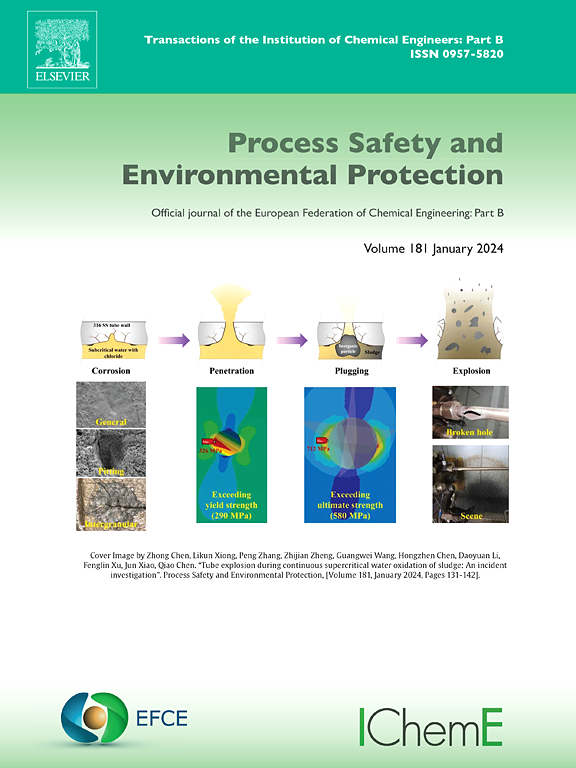Evaluating the role of green industrial policy in enhancing energy efficiency: A quasi-natural experiment based on the Five-Year Plans in China
IF 7.8
2区 环境科学与生态学
Q1 ENGINEERING, CHEMICAL
引用次数: 0
Abstract
Improving energy efficiency in the industrial sector is essential for mitigating climate pressure and advancing environmental sustainability. However, firm-level perspectives and the potential synergy between policy and market forces in improving energy performance remain underexplored. To fill the gaps, this study constructs a quasi-natural experiment based on China’s local Five-Year Plans and employs a Generalized Difference-in-Differences model to examine the causal impact of green industrial policy on firm-level energy intensity, using firm-level energy consumption data from the National Tax Survey Database. The empirical results show that: (1) Green industrial policies significantly reduce corporate energy intensity. (2) Technological upgrading and production factor reallocation serve as key channels. (3) The energy-saving effects are more effective in private firms, energy-intensive industries, regions with lower marketization levels and stricter environmental regulations. (4) The presence of clean venture capital investment amplifies the impacts. These findings enrich the research of green industrial policy and energy efficiency, providing firm-level perspectives and actionable insights for policymakers and industrial participants aiming to integrate green policy instruments into energy management strategies for safer and more sustainable industrial operations.
评价绿色产业政策在提高能源效率中的作用:基于中国五年计划的准自然实验
提高工业部门的能源效率对于缓解气候压力和促进环境可持续性至关重要。然而,公司层面的观点以及政策和市场力量在改善能源绩效方面的潜在协同作用仍未得到充分探索。为了填补这一空白,本研究基于中国地方五年计划构建了一个准自然实验,并采用广义异差模型,利用全国税务调查数据库的企业层面能源消耗数据,检验绿色产业政策对企业层面能源强度的因果影响。实证结果表明:(1)绿色产业政策显著降低了企业能源强度。(2)技术升级和生产要素再配置是关键渠道。(3)民营企业、高耗能产业、市场化程度较低、环境法规较严的地区节能效果更好。(4)清洁风险投资的存在放大了影响。这些发现丰富了绿色产业政策和能源效率的研究,为决策者和行业参与者提供了企业层面的视角和可操作的见解,旨在将绿色政策工具纳入能源管理战略,以实现更安全和更可持续的工业运营。
本文章由计算机程序翻译,如有差异,请以英文原文为准。
求助全文
约1分钟内获得全文
求助全文
来源期刊

Process Safety and Environmental Protection
环境科学-工程:化工
CiteScore
11.40
自引率
15.40%
发文量
929
审稿时长
8.0 months
期刊介绍:
The Process Safety and Environmental Protection (PSEP) journal is a leading international publication that focuses on the publication of high-quality, original research papers in the field of engineering, specifically those related to the safety of industrial processes and environmental protection. The journal encourages submissions that present new developments in safety and environmental aspects, particularly those that show how research findings can be applied in process engineering design and practice.
PSEP is particularly interested in research that brings fresh perspectives to established engineering principles, identifies unsolved problems, or suggests directions for future research. The journal also values contributions that push the boundaries of traditional engineering and welcomes multidisciplinary papers.
PSEP's articles are abstracted and indexed by a range of databases and services, which helps to ensure that the journal's research is accessible and recognized in the academic and professional communities. These databases include ANTE, Chemical Abstracts, Chemical Hazards in Industry, Current Contents, Elsevier Engineering Information database, Pascal Francis, Web of Science, Scopus, Engineering Information Database EnCompass LIT (Elsevier), and INSPEC. This wide coverage facilitates the dissemination of the journal's content to a global audience interested in process safety and environmental engineering.
 求助内容:
求助内容: 应助结果提醒方式:
应助结果提醒方式:


